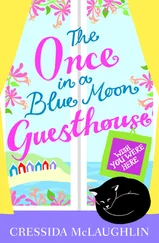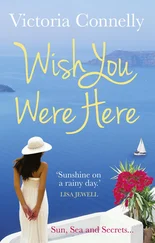ELLIE SITS IN the lay-by at Holn Cliffs, not admiring the view. Even the seagulls have vanished as if swallowed by the greyness.
There is no end to this. She might sit here for ever, or she might drive on, circling the Isle of Wight for ever. Islanded, either way. Unless she were really to cut loose. Cross the water, take the ferry (in weather like this?). Like Jack did two days ago. Though where would she go?
Or … The thought comes to her only like some idle, abstract, teasing proposition: she could cross the soggy verge to her left, burst through that shuddering hedge, and simply drive on. Cut loose that way. She’s a farmer’s daughter and she knows how to hurl a four-wheel-drive vehicle across a muddy field. But such a thing, she knows, simply wouldn’t be her.
She looks, all the same, towards the edge of the cliffs, considering the possibility like some malicious insinuation that has just been whispered in her ear. And then the other thought comes to her that isn’t idle or abstract at all, more like a kick to her heart. She’s a farmer’s daughter and once upon a time — even when she was sixteen and knew how to handle a Land Rover — she knew how to handle a gun.
The gun. That bloody gun, which he could never bring himself to get rid of. Which she could never persuade him to part with. Why had he kept it? Were they plagued with rabbits down at the site? The gun which he’d kept in that cabinet all this time, as if it might be his dad in there. And the gun which — quite absurdly, but only to answer outrage with outrage — she’d gone and suggested he might have aimed at his dad himself.
Ellie’s heart bangs. She has entirely overlooked that she has left Jack alone, in these — extreme — circumstances, with a gun. If she has the means, theoretically, less than fifty yards away, then so does he. And he has a precedent too.
A great blast of terror hits her as, in fact, the blinding buffets of weather temporarily relent. In front of her, Holn Head looms darkly but distinctly, its whole outline visible, like a ship keeping to its steady course. The clouds still engulf Beacon Hill, but that doesn’t prevent Ellie thinking she sees now in the distance, at that crucial spot in her vision, a tiny, quick flash of light.
My God. The engine of the Cherokee starts as if it’s not her doing but the direct consequence of the pounding in her chest. By a strange seeming-telepathy, the silver hatchback up ahead moves off too, as if it’s taken its hint from her, or doesn’t wish to be left alone. Or, to a neutral observer, as if they’ve both been simply prompted by the brief mercy of the weather. Are we going to sit here all day?
Ellie follows the hatchback down the descending road into Holn — wishing it would go faster. When she has to slow at the turn for Beacon Hill (though it’s more of a skidding, rocking attempt to both slow and accelerate), she experiences a moment’s odd desolation as the silver car carries on, up the rise ahead, in the direction of Sands End. She feels sure now it wasn’t just waiting out the storm, but confronting, too, some Saturday-morning catastrophe, the story of which she’ll never know.
She tears along the straight section of steeply banked road before the hill proper, even as the rain begins its onslaught again. But she’s near enough now for the cottage to be plainly visible, if only for a few seconds before the bends of the road and the high banks obscure it, and she can see that its lights are on. Hardly surprising in this weather — they would have been on when she left. But she can see that they include the bedroom light, which she interprets first as a good sign, then as a bad sign, a terrible sign, then as a sign that need not signify anything at all. Then remembers how she’d watched for Jack from that same window last night and how she’d seen his lights. He’d come back!
All of this flashes through her mind, even as, frantically, she flashes her lights, as if a watching Jack — if he’s watching — will instantly understand their coded message: ‘Jack, it’s me. I’m coming. I love you. Don’t, Jack, DON’T!’
But of course her lights are hidden by the roadside banks, and he’s not perhaps looking anyway. He’s not perhaps looking at anything any more.
Her heart hammers and, as she mounts the hill proper, still sheathed by the high banks which only give way at the bend by the old chapel, it seems she has no choice but also to go down that hill Jack once went down, alone on foot. To enter that dark but silvery, frosty tunnel that he must have gone down again and again in his mind. And, in truth, in her mind, she’s often gone down it with him, holding his hand and hoping that what was there at the bottom of the hill might not, this time, be there. Even wishing she might have gone down it with him that first time when it wasn’t in the mind but entirely, terribly real, so at least he might not have been alone, at least she could have been with him.
But how could that ever have been? And she wasn’t even with him yesterday, or the day before. And now she may have to go down that dark tunnel all by herself — Jack can’t be with her — and see what he saw at the end of it.
THE CARAVANS loom through the greyness. Jack feels an ache for them. What will become of them? More to the point, what will become of all their would-be occupants in the season to come? Only November, but the bookings sheets are already filling up with the names of regulars: the same again next year, please. What will they think? What will they do when they find out, via the reports that will surely cause some noticeable blip on the national news? If they missed the other thing or failed to make the connection, then they surely won’t miss this .
‘Tragedy in the Isle of Wight’. Or (who knows?) ‘The Siege of Lookout Cottage’.
Jack doesn’t want to disappoint any of them — the Lookouters in their scattered winter quarters all over the country. It seems for their sakes alone he might almost decide not to do what he intends. But nor, mysteriously, does he want to disappoint the caravans themselves, which he has come to see, now more than ever, as patient, dormant, hibernating creatures needing their summer influx of life. Who will look after them now?
‘The Lookout Caravan Park is closed till further notice.’ Pending future ownership. But who, with such a blot upon it, will want to take it over? A taint, a curse, and a lot more glaring than a hole in a tree.
The rain batters the window. Always, of course, the gamble of the weather. No, he couldn’t guarantee it. Even farmers had never found a way of doing that. A risk you took, no money back. And it cut both ways: a wet July, a sudden spate of cancellations. And what could you say to those who braved it? There’s always Carisbrooke Castle. Have you been to Carisbrooke Castle? Did you know (Jack certainly hadn’t known till it became part of his rainy-day patter) that Charles I had once ruled England, or thought he did, from Carisbrooke Castle?
Always an eye on the weather. Even in August it could sweep in, just like now. No, not called the Lookout for nothing. But on a good Easter, say, in good spring weather, when they started to show up in numbers, knowing they’d hit it right, it was like turning out the heifers for the first time. They felt it, you felt it. Even the caravans felt it.
He looks at them from the window, as if he’s abandoned them and they know it. Only the rapid events of the last two hours, only the shifting and sharpening of his basic plan, mean that he’s here now and not down among them, with the gun, even in this weather. That his brains, and all that they’ve ever comprehended, aren’t already strewing one of them.
Читать дальше
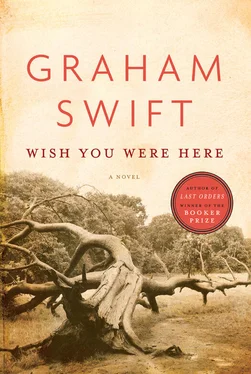




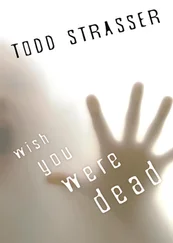

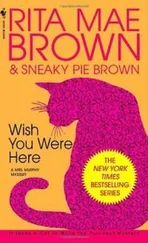
![Питер Джеймс - Wish You Were Dead [story]](/books/430350/piter-dzhejms-wish-you-were-dead-story-thumb.webp)
